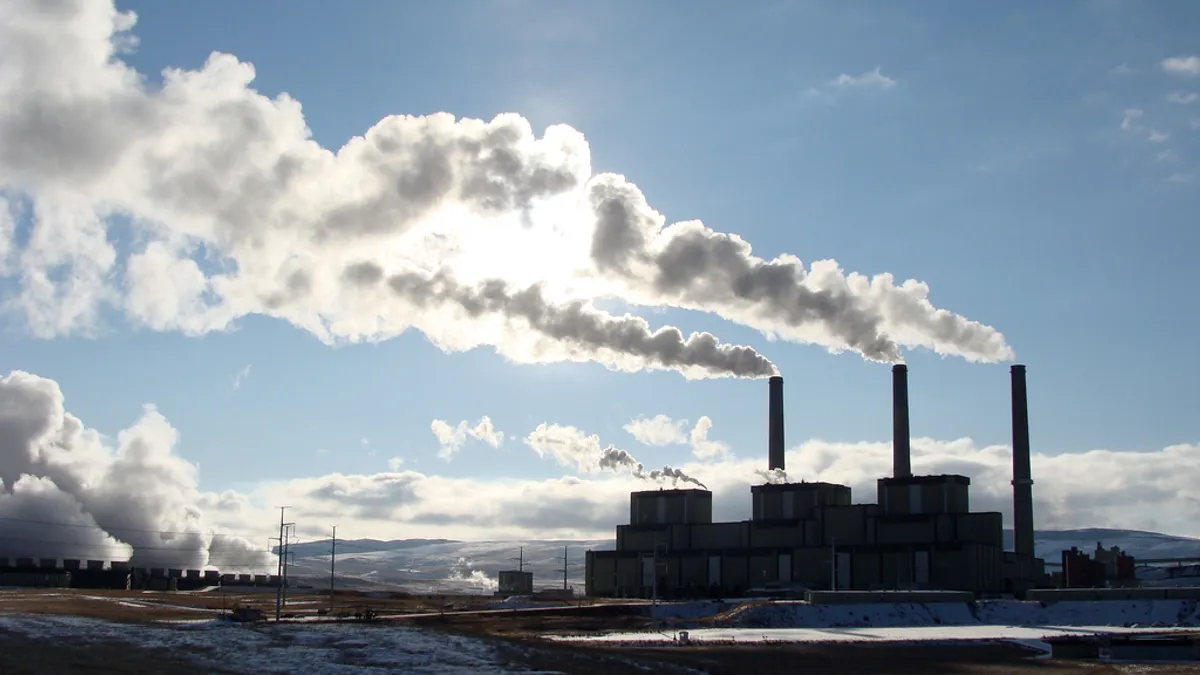Update: Dec. 4, 2020: Tri-State Generation and Transmission has filed its first Electric Resource Plan with Colorado regulators, including a "preferred scenario" that targets an 80% greenhouse gas emission reduction in the state. The utility's preferred scenario includes 1,850 MW of additional renewable generation, more than 200 MW of energy storage, and the retirement of Tri-State's remaining Colorado coal units. Critics of the utility note it is still planning to operate coal units in Arizona and Wyoming into the 2030s, and will build 300 MW of new gas plants.
Dive Brief:
- The Colorado Air Quality Control Commission (AQCC) on Friday issued a preliminary ruling to accelerate the closure of three coal plants, requiring them to shut down by the end of 2028 instead of 2030 deadlines that utilities had previously set.
- The AQCC decision impacts Tri-State Generation and Transmission's Craig 3 unit; Platte River Power Authority's Rawhide plant, and Colorado Spring's Nixon facility. The commission is also considering requiring Xcel Energy to close its Hayden coal plant early, in order to meet the state's greenhouse gas emission targets and cut regional haze.
- The decision to accelerate the closure of coal plants is "consistent with what we've been seeing nationally" and is likely to continue, said Matthew Gerhart, staff attorney for the Sierra Club Environmental Law Program.
Dive Insight:
Colorado has a goal of slicing its carbon emissions in half by 2030, and 26% below 2005 levels in the next five years.
Coal plant closures across the country are accelerating, driven by a mix of environmental policy and economics. The AQCC's decision "is just a continuation of the trend," Gerhart said.
According to the U.S. Energy Information Administration, from 2011 to the middle of this year, about 95 GW of coal capacity was taken offline and another 25 GW is slated to shut down by 2025.
The AQCC's decision is not binding — a final vote will be required in December to move ahead with the accelerated closures. Tri-State, in a statement, pushed back on the decision.
"Accelerated plant closures were unnecessary to achieve visibility goals, and exceed requirements to achieve reasonable progress toward achieving visibility improvements under the regulations,” Tri-State CEO Duane Highley said.
“We responsibly set a voluntarily retirement date for Craig Station by the end of 2029, when we intend to have added 2,000 megawatts of renewable resources," he added.
Platte River Power Authority, in a statement, said its board adopted a resource diversification policy in December 2018 that calls for the utility to work toward a 100% carbon-free energy mix by 2030. "We are taking steps to achieve that goal," the utility said. "We haven't had a chance to fully review the AQCC's preliminary ruling."
Similarly, Colorado Springs Utilities has plans to expand renewable energy and storage, and to reduce its carbon emissions by 80% by 2030.
While the commission deferred action on Xcel's Hayden coal plant, regulators are seeking more data. The AQCC directed the Air Pollution Control Division of the Colorado Department of Public Health and Environment to draft a proposal regarding potential early closure of the plant.
"We will evaluate that proposal when it becomes available," said Xcel spokesperson Michelle Aguayo. The utility plans to reduce carbon emissions 80% by 2030 in Colorado, and has a longer-term "vision to provide our customers with 100% carbon free electricity by 2050."
Xcel's plan to implement its 2030 carbon reduction goal in Colorado will be filed with the state's Public Utilities Commission in March 2021. Tri-State, similarly, will file on Dec. 1 a plan that includes an 80% reduction in greenhouse gas emissions associated with wholesale sales in the state by 2030.
Tri-State has previously faced criticism for its coal-heavy resource mix and cost, but has been working to address both. In October, the utility announced a plan to allow cooperative members to generate more of their own power and a goal to reduce wholesale rates 8% by 2023.
Despite those efforts, the Institute for Energy Economics and Financial Analysis (IEEFA) said Tri-State is "alienating" cost-conscious cooperative members with its plan to use coal for another decade and to expand into gas.
IEEFA, in a recent report, criticized Tri-State for what it said are "annual rate increases beginning in 2030 that will raise wholesale prices by 55% in the ensuing 20 years."
According to the utility, that analysis fails to take into account inflation or the upcoming PUC filing. "In real dollars, our rates are forecast to decrease," spokesperson Lee Boughey said in an email.















